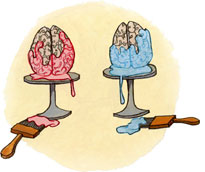
Here's a news round-up from the beginning of this week, courtesy of Rebekah Spicuglia and Women's Media Center Daily News Brief. Any other stories you think we should be reading? Post them in the comments below, please! --Kristen
In Study, Evidence Of Liberal-Bias Bias
7/27/08
LA Times: Cable talking heads accuse broadcast networks of liberal bias -- but a think tank finds that ABC, NBC and CBS were tougher on Barack Obama than on John McCain in recent weeks.
Military Women Fight Sexual Assault
7/27/08
AP via Chicago Tribune: Sexual assault and harassment involving female military personnel is not a new consequence of war. But the sheer number of women serving today - more than 190,000 so far in Iraq and Afghanistan - is forcing the military and the Department of Veterans Affairs to more aggressively address the issue.
McCain Backs Ban On Quotas
7/28/08
Boston Globe: John McCain said yesterday that he supports a proposed ballot initiative in his home state that would prohibit affirmative action policies in state and local governments.
Literacy Debate: Online, R U Really Reading?
7/27/08
NY Times: Internet-addicted children like Nadia lie at the heart of a passionate debate about just what it means to read in the digital age. The discussion is playing out among educational policy makers and reading experts around the world, and within groups like the National Council of Teachers of English and the International Reading Association.
Couric to Lead CBS News' Convention Coverage
7/29/08
Broadcasting & Cable: As expected, Katie Couric will lead CBS News' coverage of the political conventions later this summer.
Sexuality Bias Seen At Justice Department
7/29/08
LA Times: On Monday, the Justice Department's internal watchdog hinted at perhaps the most sensational justification yet -- perceived homosexuality. In a series of reports on the tenure of former Atty. Gen. Alberto R. Gonzales, the department's inspector general found that two former Justice aides used sexual orientation as a litmus test in deciding whom they would hire or fire.
Nancy Pelosi Airs Some Clean Laundry in 'Power'
7/28/08
Washington Post: In her new book "Know Your Power," Nancy Pelosi explores the route to becoming the first female speaker of the House, including growing up in Baltimore (where her father and brother both served as mayor), her years organizing in Democratic politics in California and her decision to run for Congress at 47.
Filmmakers' Point: Putting Women In Charge
7/29/08
SF Chronicle: Filmmakers Amy Sewell ("Mad Hot Ballroom") and Susan Toffler decided to make Wilson and six other smart, ambitious young women the focus of their new film, "What's Your Point, Honey?" A feminist film, it looks at the political gender gap through the lives of these ethnically diverse women.




























